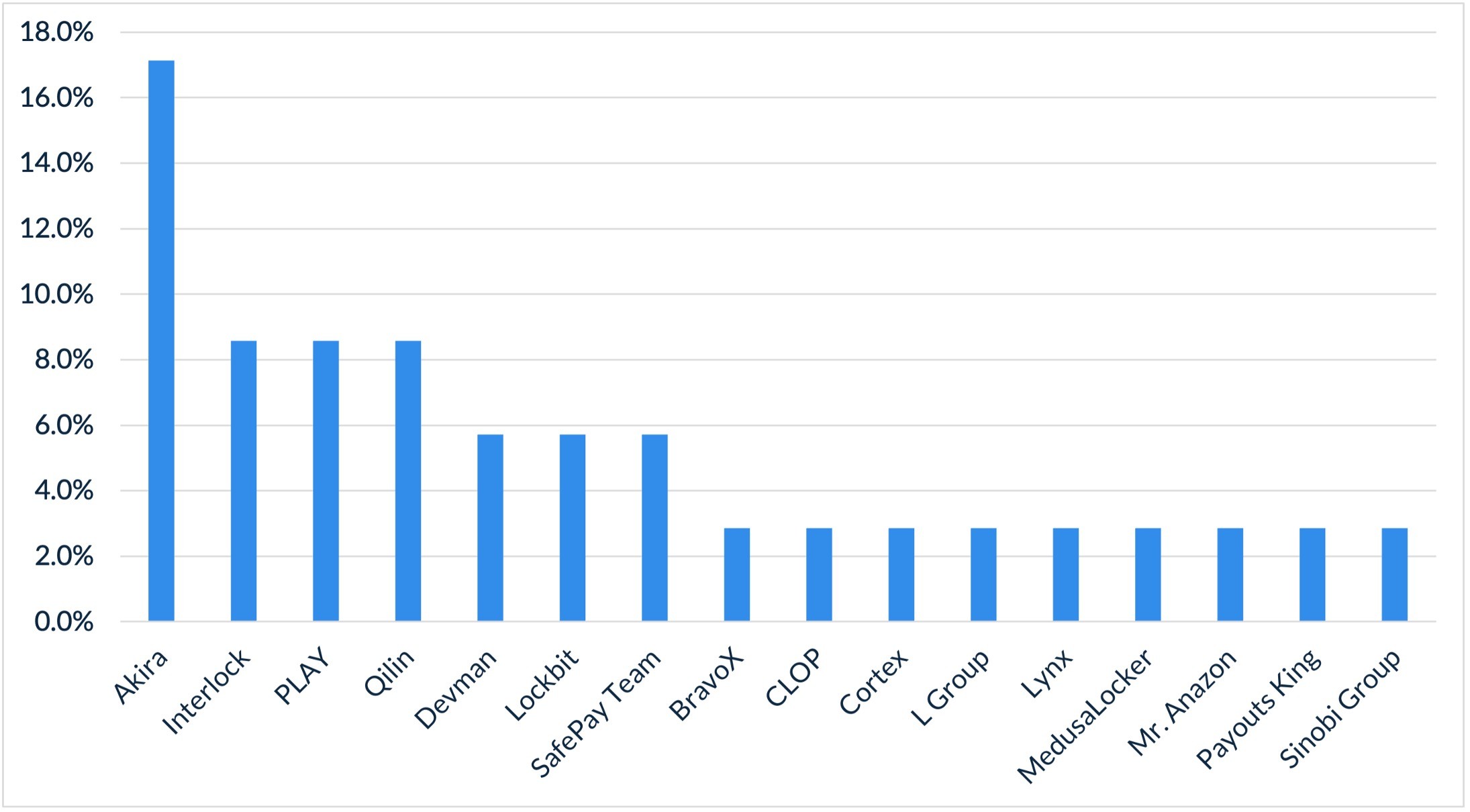Article
Iranian Hackers Working with Ransomware Groups
Sep 4, 2024
Arete Analysis
Threat Actors
An Iranian-based group of threat actors associated with the Government of Iran (GOI) is working directly with affiliates of several ransomware groups, according to a joint federal cybersecurity advisory released on August 28. The Iranian threat group, known by several names, including Pioneer Kitten, Fox Kitten, UNC757, Parisite, RUBIDIUM, and Lemon Sandstorm, has provided affiliates associated with the ransomware groups ALPHV/BlackCat, NoEscape, and RansomHouse with access to victim networks and assistance extorting victims for ransom payments in return for a percentage of the ransom collected.
What’s Notable and Unique
Although the Pioneer Kitten threat group conducts cyberattacks in support of the GOI, researchers believe that its activity with ransomware groups is separate and unsanctioned by the GOI. When working with affiliates of the ransomware groups, the group does not share its Iranian nationality or location.
The Iranian threat actors have exploited the recent Check Point Security Gateways vulnerability CVE-2024-24919, which can allow an attacker to gain domain admin privileges. The hotfix for this vulnerability can be found here.
To assist in identifying future attacks associated with the Pioneer Kitten threat group, the FBI provided indicators of compromise, bitcoin addresses, and Tox messenger identifiers in the advisory report.
Analyst Comments
This collaboration between members of the Iranian Pioneer Kitten group and ransomware affiliates adds a layer of complexity when assessing a sanctions nexus. With ALPHV no longer operating as a ransomware-as-a-service (RaaS), it is possible the Iranian threat actors will align themselves with affiliates of newer RaaS organizations in the future. Arete remains diligent in studying ransomware adversaries’ operations and tactics, techniques, and procedures to identify groups with potential ties to sanctioned entities. Additionally, to help prevent being targeted by the Pioneer Kitten, the FBI and CISA recommend that organizations “review available logs for IP addresses” provided in the advisory “to identify historical activity or incidents which may have previously been identified.” The advisory also recommends organizations patch the CVE vulnerabilities and check for the identifiers and TTPs referenced in the report.
Sources
Back to Blog Posts
Article
Feb 12, 2026
2025 VMware ESXi Vulnerability Exploited by Ransomware Groups
Ransomware groups are actively exploiting CVE‑2025‑22225, a VMware ESXi arbitrary write vulnerability that allows attackers to escape the VMX sandbox and gain kernel‑level access to the hypervisor. Although VMware (Broadcom) patched this flaw in March 2025, threat actors had already exploited it in the wild, and CISA recently confirmed that threat actors are exploiting CVE‑2025‑22225 in active campaigns.
What’s Notable and Unique
Chinese‑speaking threat actors abused this vulnerability at least a year before disclosure, via a compromised SonicWall VPN chain.
Threat researchers have observed sophisticated exploit toolkits, possibly developed well before public disclosure, that chain this bug with others to achieve full VM escape. Evidence points to targeted activity, including exploitation via compromised VPN appliances and automated orchestrators.
Attackers with VMX level privileges can trigger a kernel write, break out of the sandbox, and compromise the ESXi host. Intrusions observed in December 2025 showed lateral movement, domain admin abuse, firewall rule manipulation, and staging of data for exfiltration.
CISA has now added CVE-2025-22225 to its Known Exploited Vulnerabilities (KEV) catalog, underscoring ongoing use by ransomware attackers.
Analyst Comments
Compromise of ESXi hypervisors significantly amplifies operational impact, allowing access to and potential encryption of dozens of VMs simultaneously. Organizations running ESXi 7.x and 8.x remain at high risk if patches and mitigations have not been applied. Therefore, clients are recommended to apply VMware patches from VMSA‑2025‑0004 across all ESXi, Workstation, and Fusion deployments. Enterprises are advised to assess their setups in order to reduce risk, as protecting publicly accessible management interfaces is a fundamental security best practice.
Sources
CVE-2025-22225 in VMware ESXi now used in active ransomware attacks
The Great VM Escape: ESXi Exploitation in the Wild
VMSA-205-004: VMware ESXi, Workstation, and Fusion updates address multiple vulnerabilities (CVE-205-22224, CVE-2025-22225, CVE-2025-22226)
Read More
Article
Feb 5, 2026
Ransomware Trends & Data Insights: January 2026
Although Akira was once again the most active ransomware group in January, the threat landscape was more evenly distributed than it was throughout most of 2025. In December 2025, the three most active threat groups accounted for 57% of all ransomware and extortion activity; in January, the top three accounted for just 34%. Akira’s dominance also decreased to levels more consistent with early 2025, as the group was responsible for almost a third of all attacks in December but just 17% in January.
The number of unique ransomware and extortion groups observed in January increased slightly, to 17, up from 14 in December. It is too early to assess whether this trend will be the new normal for 2026. It is also worth noting that overall activity in January was lower than in previous months, consistent with what Arete typically observes at the beginning of a new year.

Figure 1. Activity from all threat groups in January 2026
Throughout the month of January, analysts at Arete identified several distinct trends behind the threat actors perpetrating cybercrime activities:
In January, Arete observed the reemergence of the LockBit Ransomware-as-a-Service (RaaS) group, which deployed an updated “LockBit 5.0” variant of its ransomware. LockBit first announced the 5.0 version on the RAMP dark web forum in early September 2025, coinciding with the group’s six-year anniversary. The latest LockBit 5.0 variant has both Windows and Linux versions, with notable improvements, including anti-analysis features and unique 16-character extensions added to each encrypted file. However, it remains to be seen whether LockBit will return to consistent activity levels in 2026.
The ClickFix social engineering technique, which leverages fake error dialog boxes to deceive users into manually executing malicious PowerShell commands, continued to evolve in unique ways in January. One campaign reported in January involved fake Blue Screen of Death (BSOD) messages manipulating users into pasting attacker-controlled code. During the month, researchers also documented a separate campaign, dubbed “CrashFix,” that uses a malicious Chrome browser extension-based attack vector. It crashes the web browser, displays a message stating the browser had "stopped abnormally," and then prompts the victim to click a button that executes malicious commands.
Also in January, Fortinet confirmed that a new critical authentication vulnerability affecting its FortiGate devices is being actively exploited. The vulnerability, tracked as CVE-2026-24858, allows attackers with a FortiCloud account to log in to devices registered to other account owners due to an authentication bypass flaw in devices using FortiCloud single sign-on (SSO). This recent activity follows the exploitation of two other Fortinet SSO authentication flaws, CVE-2025-59718 and CVE-2025-59719, which were disclosed in December 2025.
Source
Arete Internal
Read More
Article
Feb 2, 2026
New FortiCloud SSO Vulnerability Exploited
Fortinet recently confirmed that its FortiGate devices are affected by a new critical authentication vulnerability that is being actively exploited. The vulnerability, tracked as CVE-2026-24858, allows attackers with a FortiCloud account to log in to devices registered to other account owners due to an authentication bypass flaw in devices using FortiCloud single sign-on (SSO). CISA added the vulnerability to its Known Exploited Vulnerabilities catalogue and gave federal agencies just three days to patch, which requires users to upgrade all devices running FortiOS, FortiManager, FortiAnalyzer, FortiProxy, and FortiWeb to fixed versions. This recent activity follows the exploitation of two other SSO authentication flaws, CVE-2025-59718 and CVE-2025-59719, which were disclosed last month.
What’s Notable and Unique
There are strong indications that much of the recent exploitation activity was automated, with attackers moving from initial access to account creation within seconds.
As observed in December 2025, the attackers’ primary target appears to be firewall configuration files, which contain a trove of information that can be leveraged in future operations.
The threat actors in this campaign favor innocuous, IT-themed email and account names, with malicious login activity originating from cloud-init@mail[.]io and cloud-noc@mail[.]io, while account names such as ‘secadmin’, ‘itadmin’, ‘audit’, and others are created for persistence and subsequent activity.
Analyst Comments
This is an active campaign, and the investigation into these attacks is ongoing. Organizations relying on FortiGate devices should remain extremely vigilant, even after following patching guidance. With threat actors circumventing authentication, it’s crucial to monitor for and alert on anomalous behavior within your environment, such as the unauthorized creation of admin accounts, the creation or modification of access policies, logins outside normal working hours, and anything that deviates from your security baseline.
Sources
Administrative FortiCloud SSO authentication bypass
Multiple Fortinet Products’ FortiCloud SSO Login Authentication Bypass
Arctic Wolf Observes Malicious Configuration Changes On Fortinet FortiGate Devices via SSO Accounts
Arctic Wolf Observes Malicious SSO Logins on FortiGate Devices Following Disclosure of CVE-2025-59718 and CVE-2025-59719
Read More
Podcast
Jan 26, 2026
Cyber Campfire: December Threat Trends & Insights
Cyber Campfire delivers data-driven insights from Arete’s Threat Intelligence Team. In this episode, we discuss cyber threat trends, statistics, and emerging threat actors from December 2025. Tune in for an in-depth look at the evolving threat landscape and actionable insights for global organizations and security partners.
Read More




